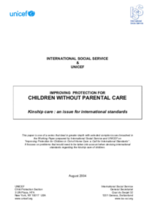Of the millions of children throughout the world who are in out-of-home care, most are being looked after by grandparents or other members of their family. This form of care – known as kinship care – is indeed the most significant “alternative care” solution in a wide variety of countries.
While there is a considerable a priori advantage for a child to be looked after by family members or others familiar to him or her, often in the original community, kinship in itself is no guarantee of welfare, protection and ability to cope. Yet kinship care is often subjected to far less supervision than its non-kinship counterpart, and in most cases to no supervision at all. It is not referred to in any internationally-recognised standards or guidelines.
This paper is one of a series that deal in greater depth with selected complex issues broached in the Working Paper prepared by International Social Service and UNICEF on “Improving Protection for Children in Out-of-Home Care: A Call for International Standards.” It seeks to outline issues that would need to be taken into account when devising international standards regarding the kinship care of children. By exploring the advantages and limitations of kinship care, informal and formal kinship care arrangements, child-headed households, and cross-border manifestations of kinship care, this paper highlights a wide range of concerns that inform basic questions to be answered in international standard-setting.
©UNICEF and International Social Service

